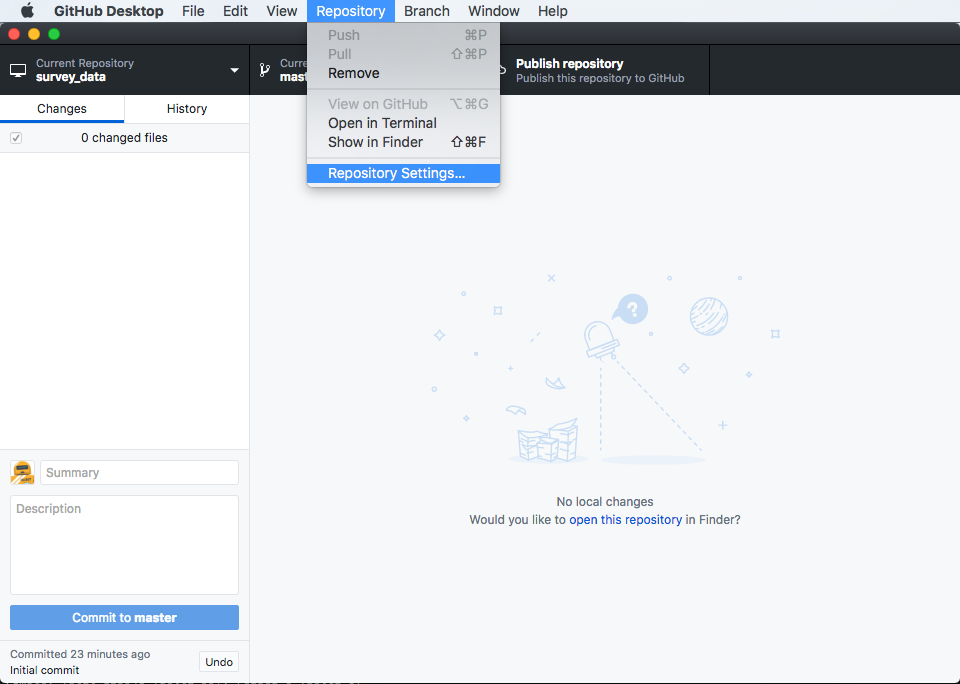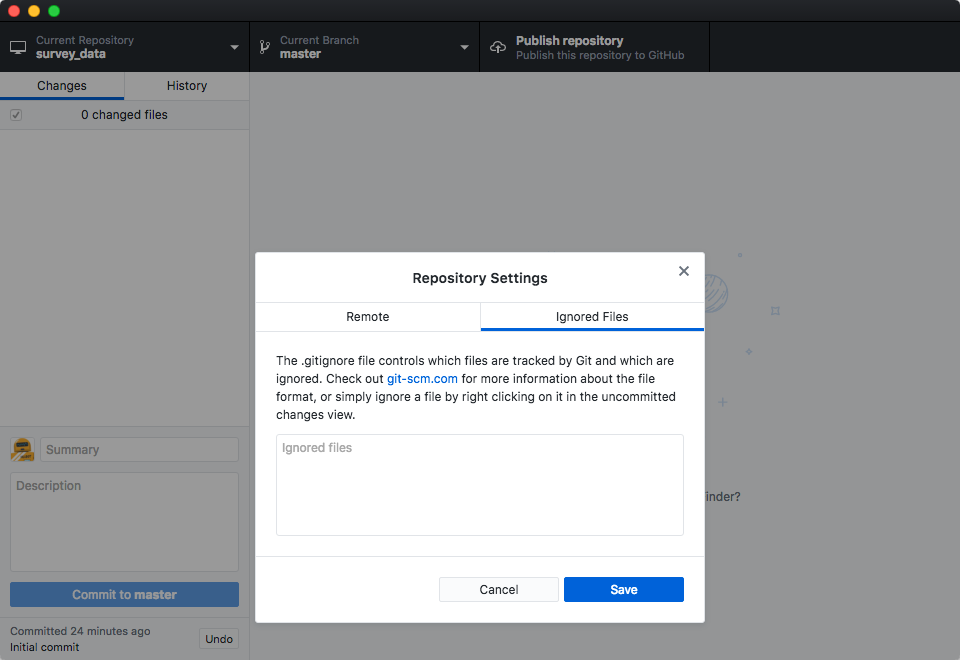Ignoring Things
Overview
Teaching: 5 min
Exercises: 0 minQuestions
How can I tell Git to ignore files I don’t want to track?
Objectives
Configure Git to ignore specific files.
Explain why ignoring files can be useful.
This section will touch briefly on how you can tell git to ignore certain files and why that can be useful.
What if we have files that we do not want Git to track for us, like backup files created by our editor or intermediate files created during data analysis.
To ignore files in your repository with GitHub Desktop go to the Repository menu and select Repository Settings…

With the Repository Settings pop-up open, click the Ignored Files tab. Here you will be able to add file names, directory names, or patterns for Git to ignore in your repository.

If you want to follow along, add .DS_Store to the list, which a common macOS
hidden system file that often is accidentally added to repositories.
You will notice a new change has been staged for the repository because the Git ignore file did not exist before. The hidden .gitignore file is how Git tracks which files to not track. You’ll need to add it to the repository to make sure you continually ignore those files.
This is as much as we’ll cover in this section, but take a look at the tips below if you want more information.
Ignoring Nested Files
Given a directory structure that looks like:
results/data results/plotsHow would you ignore only
results/plotsand notresults/data?Solution
As with most programming issues, there are a few ways that you could solve this. If you only want to ignore the contents of
results/plots, you can change your.gitignoreto ignore only the/plots/subfolder by adding the following line to your .gitignore:
results/plots/If, instead, you want to ignore everything in
/results/, but wanted to trackresults/data, then you can addresults/to your .gitignore and create an exception for theresults/data/folder. The next challenge will cover this type of solution.Sometimes the
**pattern comes in handy, too, which matches multiple directory levels. E.g.**/results/plots/*would make git ignore theresults/plotsdirectory in any root directory.
Including Specific Files
How would you ignore all
.datafiles in your root directory except forfinal.data? Hint: Find out what!(the exclamation point operator) doesSolution
You would add the following two lines to your .gitignore:
*.data # ignore all data files !final.data # except final.dataThe exclamation point operator will include a previously excluded entry.
Ignoring all data Files in a Directory
Given a directory structure that looks like:
results/data/position/gps/a.data results/data/position/gps/b.data results/data/position/gps/c.data results/data/position/gps/info.txt results/plotsWhat’s the shortest
.gitignorerule you could write to ignore all.datafiles inresult/data/position/gps? Do not ignore theinfo.txt.Solution
Appending
results/data/position/gps/*.datawill match every file inresults/data/position/gpsthat ends with.data. The fileresults/data/position/gps/info.txtwill not be ignored.
The Order of Rules
Given a
.gitignorefile with the following contents:*.data !*.dataWhat will be the result?
Solution
The
!modifier will negate an entry from a previously defined ignore pattern. Because the!*.dataentry negates all of the previous.datafiles in the.gitignore, none of them will be ignored, and all.datafiles will be tracked.
Log Files
You wrote a script that creates many intermediate log-files of the form
log_01,log_02,log_03, etc. You want to keep them but you do not want to track them throughgit.
Write one
.gitignoreentry that excludes files of the formlog_01,log_02, etc.Test your “ignore pattern” by creating some dummy files of the form
log_01, etc.You find that the file
log_01is very important after all, add it to the tracked files without changing the.gitignoreagain.Discuss with your neighbor what other types of files could reside in your directory that you do not want to track and thus would exclude via
.gitignore.Solution
- append either
log_*orlog*as a new entry in your .gitignore- track
log_01usinggit add -f log_01
Key Points
The
.gitignorefile tells Git what files to ignore.